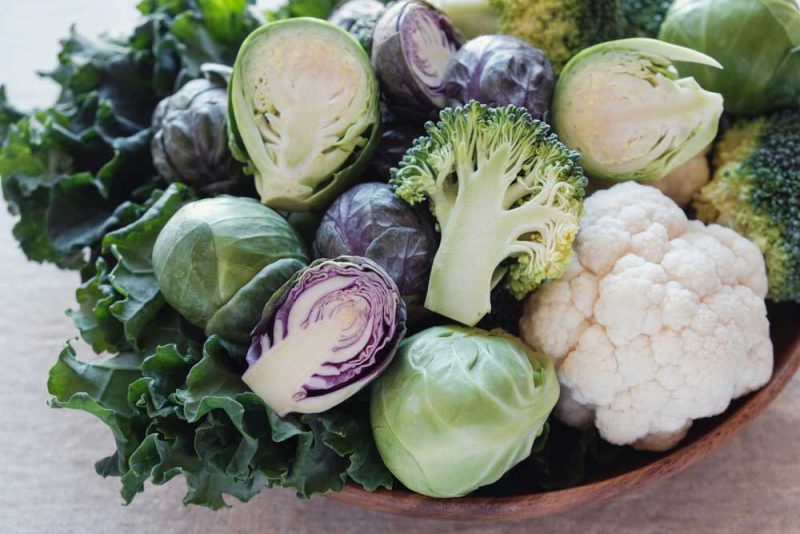The thyroid gland is butterfly-shaped in the front of the neck, which produces hormones T3 and T4 and secretes them into the bloodstream. This gland also regulates the body’s metabolic activities, such as heart rate and calorie burning. An underactive thyroid does not produce enough of these hormones, and secretion of hormones, which regulate metabolism, is reduced. The most common of these symptoms:
- Tiredness
- Cold intolerance
- Weight gain without increasing food intake
- Constipation
- Depression and anxiety
- Dry hair, scaly skin, and brittle nails
- Muscle aches and weakness
Hypothyroidism can slow down your body’s metabolism, and you should know that having a proper diet can save your life. Patients with hypothyroidism have a slower metabolism, and they burn fewer calories at rest time, so weight gain for them is inevitable. If you gain weight, you will have other problems that are caused by being overweight, such as diabetes and high blood pressure. A proper diet will not only improve your thyroid function but will also cure many of your underlying diseases.
Also Read: Causes of High Blood Pressure – Risk Factors
Foods to avoid
Soy
Which one is worse for the thyroid, eating soy foods, or eating too much soy. The mineral iodine is an essential ingredient for thyroid hormone, but soy contains isoflavone compounds that prevent iodine from working correctly. Many people with hypothyroidism do not have to desist soy wholly, but it is wise to reduce the number of soy meals per week and avoid processed soy foods. Foods that have processed protein of soy have more isoflavones.
- soy milk
- soy sauce
- edamame
- tofu
- miso
Cruciferous vegetables
Cabbage, broccoli, and similar vegetables are high in nutrients, but cruciferous vegetables also contain an enzyme called goiter, which makes it difficult to produce the thyroid hormone.
- Collards
- Brussels sprouts
- Russian kale
- Broccoli
- Broccoli rabe
- Cauliflower
- Cabbage
You do not need to remove these vegetables totally, but you should care about the amount of them. There are no problems with a few servings of cruciferous vegetables a week, but eating these vegetables daily can make a problem for you.
Just make sure these vegetables cooked well when eaten. Heat neutralizes the function of the enzyme in them.
Gluten
Not using gluten is not right for everyone, but some experts believe that gluten-rich foods such as wheat, barley, and rye stimulate inflammation and antibodies to thyroid tissue. There haven’t proved yet that all people with hypothyroidism should remove gluten. But if you feel uncomfortable eating foods that contain gluten, you should avoid them altogether.
Processed foods
Processed foods are high in calories and have very few benefits, so, you should be avoided. This food also causes weight gain. Furthermore, the fat in fast food prevents the secretion of thyroid hormones and the absorption of this hormone through alternative drugs.
Examples of processed foods include:
- fast food
- hot dogs
- donuts
- cakes
- cookies

Which nutrients are important?
Iodine
Iodine is an essential mineral for the production of thyroid hormones. People with iodine deficiency are at risk for hypothyroidism. Iodine deficiency is very common, and also if you are iodine deficient, you can change your diet and eat foods rich in iodine.
- cheese
- milk
- ice cream
- iodized table salt
- saltwater fish
- seaweed
- whole eggs
Selenium
Selenium is a mineral that is highly concentrated in the thyroid gland and plays a very significant role in the production of thyroid hormones. This essential mineral also has antioxidant properties, so it can protect the thyroid gland from damage by molecules called free radicals. Adding selenium-rich foods to your diet is a great way to increase your body’s selenium levels.
- Brazil nuts
- tuna
- shrimp
- beef
- turkey chicken
- chicken
- ham
- eggs
- oatmeal
- whole wheat bread
Zinc
Zink, like selenium, helps activate thyroid hormones. Research has shown that zinc can help regulate TSH levels, which is a hormone that stimulates the thyroid gland to secrete thyroid hormone. If you have hypothyroidism, you should eat more zinc-rich foods such as
- oysters
- beef
- crab
- fortified cereal
- pork
- chicken
- legumes
- pumpkin seeds
- yogurt
The role of vitamins and minerals in the hypothyroidism diet
- Vitamin C is essential for the metabolism of tyrosine which is an amino acid and protein component. Fruits are rich sources of vitamin C.
- Vitamin E is needed to metabolize selenium.
- Vitamin B has a substantial role in deficiency and thyroid disorders. The level of this vitamin is low in people with hypothyroidism.
- Whole grains, fish, seafood, eggs, dairy, and leafy vegetables are high in vitamins E and B.
- Sources of vitamin A include eggs, green vegetables, and oily fish, yellow and orange fruits.
- Protein is useful for reducing the symptoms of hypothyroidism. Foods rich in protein include fish, beef, eggs, dairy, and vegetables.
- Good sources of fiber include leafy vegetables, green beans, various fruits including figs, apples, plums, citrus fruits, and cereals, and nuts. You should not consume fiber excessively because it disrupts the production of the thyroid hormone.
- Avoid caffeinated beverages and sugar.
- Omega-3 fatty acids, which rich sources are in cold-water oily fish, are effective in relieving the symptoms of hypothyroidism.
People with hypothyroidism should have a proper diet based on vegetables, fruits, and lean meat. These types of foods are low in calories and satiating and can help prevent weight gain. People with hypothyroidism have many options for a suitable diet. They can eat eggs, meat, fish, most fruits and vegetables, gluten-free cereals and grains, dairy products, and decaffeinated beverages.
Summary
SunExport try to introduce Iranian agricultural products‘ quality and test to the world. SunExport, the best Iranian exporter company, exports high-quality types of dates and dates products (Date syrup, Date sauce, Date paste, Date cream.) to all around the world.
For Pricing and order, please contact us.

